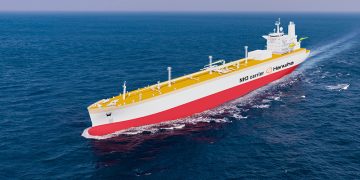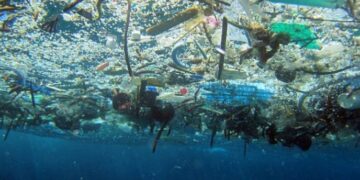In an exclusive interview to SAFETY4SEA, Mr. Andrew Roberts, Executive Director, EMEA, RightShip, highlights the importance of data sharing and increased transparency for enhanced safety culture, both onboard and ashore. Data sharing also helps organization to choose the proper decarbonization initiatives and they can be held accountable for cases of crew abandonment.
In its latest Seafarer abandonment report, RightShip revealed that almost 10,000 seafarers have been abandoned in that time, in cases involving 703 vessels. As such, Mr Roberts pinpoints that companies which have little regard for the welfare and human rights of their crew must not be allowed to continue to operate. ‘’Through highlighting the issue to industry stakeholders at all levels and interests, we can make clear that without action, the issue may start to affect their bottom line and reputation. ‘’ he highlights.
SAFETY4SEA: What are currently the key challenges for shipping from your perspective? What are your suggestions to move forward?
Andrew Roberts: The challenge facing the whole maritime industry to reduce emissions and the immense pressure in this area is well known. Less publicised is the shocking number of crew abandonment cases over the past 20 years. Our latest Seafarer abandonment report reveals that almost 10,000 seafarers have been abandoned in that time, in cases involving 703 vessels. We are striving for a maritime industry which causes zero harm to people and planet, and for this to happen, there needs to be increased accountability from all industry players, increased transparency across individuals, and a culture of data-sharing within the maritime space extending beyond the immediate maritime players to suppliers and consumers. Operators can harness valuable data to ensure they are making the right choices when it comes to decarbonisation initiatives. Likewise, through data-sharing, companies can now be held accountable for cases of crew abandonment, reducing future harm to seafarers.
S4S: What should be our key priorities for strengthening safety culture onboard and ashore?
A.R.: Data-sharing and increased transparency are just two of the ways that we can ensure a stronger culture of safety both onboard and ashore. The more third-party, independent data there is being used by industry stakeholders, the more chance we have to hold companies accountable for poor safety management or for contributing to high numbers of seafarer abandonment cases. As an independent data-hub for the shipping world, we already identify vessels linked to a company associated with abandonment using our online portal. This way, it is clear that we don’t recommend them to our customers for voyages and they are graded as unacceptable during our vetting processes. These are small steps to highlight individual cases and incidents, but they go a long way in ensuring that further harm is prevented, and companies, or flag states, don’t shirk responsibility.
S4S: What is the most important factor in better protecting worker’s human, labour and social rights at sea? And how can we ensure that crew welfare issues are on top of all ship operators’ agenda?
A.R.: In the time taken to resolve abandonments, seafarers are often trapped and out of pocket. Their plight is mostly unknown to the rest of the world, despite being absolutely integral to both the global economy and the maritime industry. When it comes to protecting these lives and livelihoods, the first step is highlighting the issue and sparking much needed conversation around where these hotspots of crew abandonment are, who these companies are, and where they are based out of. Homing in on and sharing this data enables smarter decision making, leading to an increased chance of physical, social, and mental safety and job security for future crews. At the end of the day, operators who have little regard for the welfare and human rights of their crew must not be allowed to continue to operate, and through highlighting the issue to industry stakeholders at all levels and interests, we can make clear that without action, the issue may start to affect their bottom line and reputation.
S4S: Are you satisfied with industry stakeholders’ response on the crew abandonment cases? Which should be industry’s key priorities towards that issue?
A.R.: The sad truth is that as long as seafarer abandonment cases continue to rise, then the response from the industry and its stakeholders isn’t enough. However, there are reasons to be optimistic and, as discussed, the key priority here has to be data and transparency. The use of data helps the maritime industry to identify those operators who have little, or no interest, in the welfare of their crew – and enables us to make others aware of their behaviour. This can also play a role in persuading those yet to be convinced that taking up the social responsibility of crew welfare is essential. We’re hopeful that tools like our Crew Welfare Assessment – and our background research – can encourage those in the maritime industry to move towards doing the right thing and build a supply chain with full transparency. In turn this should make it increasingly difficult for ship owners to perform these acts towards the seafarers.
S4S: What is your message to industry stakeholders with regards to a more sustainable future for shipping?
A.R.: Think strategically about sustainability initiatives and how they can be transparent and informed, as well as supported by robust data. The industry and its stakeholders are calling out for transparency. National and local governments are placing greater emphasis on environmental protection and supply chain social due diligence, and even the investor community is increasingly concerned with the ESG performance of its portfolio. Therefore, if a stakeholder hopes to raise capital or secure permission for an expansion or program of development, it may well have an easier time if it can point to a track record of responsible operations, with a credible data trail to prove it.
The views presented are only those of the author and do not necessarily reflect those of SAFETY4SEA and are for information sharing and discussion purposes only.






























































